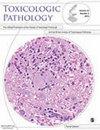Exogenous Growth Hormone Exacerbates Post-Irradiation Atherosclerosis in Susceptible Epicardial Coronary Arteries
IF 1.4
4区 医学
Q3 PATHOLOGY
引用次数: 0
Abstract
Cardiac exposure to ionizing radiation can damage both the microvasculature and coronary arteries, as well as increase the long-term risk of heart disease, myocardial fibrosis, and conduction abnormalities. Therapeutic agents capable of promoting recovery from radiation injury to the heart are limited. Growth hormone is linked to improved cardiac function following injury. Here, we leveraged a cynomolgus macaque model to determine the long-term outcomes of recombinant human growth hormone (rhGH) therapy on the heart following low-dose ionizing radiation. Macaques were exposed to 2 Gy radiation, treated with rhGH for one month, and assessed after 2 years. Overall, plasma lipid profile, cardiac function, and coronary artery disease were similar between rhGH and placebo treated animals. However, a subgroup of rhGH-treated animals exhibited more extensive atherosclerotic plaques in the coronary arteries. Together, these findings indicate that transient human growth hormone therapy subsequent to a single low dose of ionizing radiation involving the heart does not result in long-term changes to plasma cholesterol but may promote exacerbated coronary artery disease in a subset of individuals.外源性生长激素加剧易受辐射影响的心外膜冠状动脉辐射后动脉粥样硬化
心脏暴露于电离辐射会损伤微血管和冠状动脉,并增加患心脏病、心肌纤维化和传导异常的长期风险。能够促进心脏从辐射损伤中恢复的治疗药物非常有限。生长激素与损伤后心脏功能的改善有关。在这里,我们利用猕猴模型来确定重组人生长激素(rhGH)疗法对低剂量电离辐射后心脏的长期影响。猕猴受到2 Gy辐射,接受一个月的rhGH治疗,两年后进行评估。总体而言,接受rhGH和安慰剂治疗的动物的血浆脂质状况、心脏功能和冠状动脉疾病情况相似。然而,一部分接受过rhGH治疗的动物的冠状动脉出现了更广泛的动脉粥样硬化斑块。总之,这些研究结果表明,对心脏进行单次低剂量电离辐射后的短暂人体生长激素治疗不会导致血浆胆固醇的长期变化,但可能会促使一部分人的冠状动脉疾病恶化。
本文章由计算机程序翻译,如有差异,请以英文原文为准。
求助全文
约1分钟内获得全文
求助全文
来源期刊

Toxicologic Pathology
医学-病理学
CiteScore
4.70
自引率
20.00%
发文量
57
审稿时长
6-12 weeks
期刊介绍:
Toxicologic Pathology is dedicated to the promotion of human, animal, and environmental health through the dissemination of knowledge, techniques, and guidelines to enhance the understanding and practice of toxicologic pathology. Toxicologic Pathology, the official journal of the Society of Toxicologic Pathology, will publish Original Research Articles, Symposium Articles, Review Articles, Meeting Reports, New Techniques, and Position Papers that are relevant to toxicologic pathology.
 求助内容:
求助内容: 应助结果提醒方式:
应助结果提醒方式:


